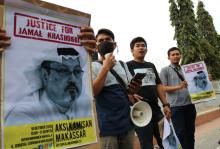Commentary

THANKS TO CANADA'S universal health-care system, most Canadians have never had to worry about paying medical bills. Everyone gets the care they need, at a cost far below the hit-or-miss U.S. health-care system. It’s little wonder that 94 percent of Canadians boast proudly about their national health care—even more than they hoot about hockey.
Tommy Douglas, the architect of the Canadian single-payer system, rolled out the plan while serving as a five-term premier of Saskatchewan. But Douglas’ drive to ensure health care for all didn’t originate from his politics. It was developed from his faith and his pre-political life as a Baptist minister.
In 1930, when Douglas became pastor at Calvary Baptist Church in Weyburn, Saskatchewan, he joined an agricultural community brutally impacted by drought and economic depression. At first, Douglas focused on intensive relief efforts. Soon he embraced advocacy as well.
As Douglas put it, “You’re never going to step out of the front door into the kingdom of God. What you’re going to do is slowly and painfully change society until it has more of the values that emanate from the teachings of Jesus or from other great religious leaders.”

SINCE HOBBY LOBBY won its landmark case in 2014, the religious freedom narrative has been dominated by traditionalist, politically conservative Christians. But for most of our nation’s history, religious freedom was a bipartisan value that echoed a commitment to inclusive pluralism.
In 1993 and 2000, religious freedom laws were passed almost unanimously in Congress, with support from social progressives as well as conservatives. Religious freedom was viewed as a basic constitutional right that should be applied indiscriminately.
The 2016 election only exacerbated the perception of religious freedom as a conservative Christian value. President Trump vocally supported Jack Phillips, the baker of the Masterpiece Cakeshop case who refused to bake for a gay couple’s wedding because of his religious beliefs. Trump took steps to dismantle the Johnson Amendment, which protects nonprofits from partisan political manipulation and, with the signing of the first of his two executive orders on religious freedom, announced, “We are giving our churches their voices back.”
In some cases, conservatives are claiming their right to religious freedom in entirely appropriate ways. Yet, in too many cases, far-right Christians have used religious freedom as a loophole for discrimination or to evade civil rights laws. And secular progressives have allowed them to do it, ceding religious liberty to extremists and jeopardizing this core tenet of democracy.
But that narrative could be changing.

IN THE DECADES before the Civil War, three of the nation’s largest Protestant denominations—Baptists, Presbyterians, and Methodists—split over slavery, biblical interpretation, and abolition. Historians have long claimed that these denominational schisms paved the way for a national rift. Once these Protestant churches failed to hold together, breaking into regional bodies of South and North, wrote C.C. Goen in Broken Churches, Broken Nation, “a major bond of national unity” dissolved and hastened America’s warring fate.
As the churches divided over slavery then, so they are dividing over sexuality and gender now. Many of the biblical arguments and hermeneutic approaches once used to support slavery are now employed to reject the humanity, gifts, and dignity of women and LGBTQ persons. If you read 19th century sermons or tracts from Southern Presbyterians, for example, you only need to swap out a few words and you have a blog about how the Bible doesn’t allow women to preach or gay and lesbian couples to marry. Mark Twain once quipped that history doesn’t repeat itself, but it does rhyme. In this case, however, the similarities are so striking that history appears to plagiarize itself.
In recent years, Episcopalians, Lutherans, and Presbyterians have all faced contentious splits over these issues, and now the United Methodist Church—the largest mainline Protestant denomination—is struggling with the same.
History may plagiarize, but it will not repeat. These denominations aren’t as significant as they once were, culturally or politically. The Baptists not only split over slavery but remained permanently divided in Northern and Southern branches, then divided and divided again. The Methodists reunited in the 20th century, as did the Presbyterians. But for all their remarkable contributions, neither denomination regained its former status.
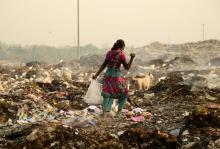
THE WORLD RECEIVED some very good news in September. The percentage of the global population living in extreme poverty has dropped from 36 percent in 1990 to 10 percent in 2015, the lowest in recorded history. Over this period more than 1 billion people lifted themselves out of the quicksand of extreme poverty.
The Millennium Development Goals, agreed to through the United Nations in 2000, helped galvanize global leadership to cut extreme poverty in half in 15 years, a goal that was achieved a few years early due to remarkable progress in China and India. About half of the world’s countries have reduced extreme poverty below 3 percent.
In 2016, the MDGs were replaced by the Sustainable Development Goals. The SDGs represent a more integrated and comprehensive global agenda centered around 17 goals and 169 targets that now apply to every country in the world, not only to developing countries. They combine a commitment to end extreme poverty by the year 2030—especially in countries across sub-Saharan Africa and fragile conflict-affected states where progress has been uneven—with commitments to protect the environment, address climate change, combat inequality, promote peace, and improve governance.

AT THE VERY hour when modern humanity arrived at the pinnacle of triumph—a global marketplace promising riches for all—the skies have been darkened by the terrible specters of ecological crisis and social disruption. This realization dawns just as the urban age has been declared: More than half of humanity now lives in cities.
Surely these occurrences—the urban age and the overlapping crises of our time—are connected. Indeed, any reconciliation with the Earth will doubtless involve a “great resettlement” of our species, through which we, homo urbanis, endeavor to reconcile our urbanity with planetary limits—the epoch of the great suburban dispensation.
Our work defines this challenge by focusing on the suburbs: the sprawling, low-density urban landscape that surrounds large cities, especially in the “new world” of North America, Australia, and New Zealand.

WHEN I WAS a high school soccer and basketball player, locker rooms were a sanctuary for me. I remember elaborate pregame handshakes and earnest debates over whether it was okay to pray for a win. I chatted with teammates about defensive strategy, physics homework, and crushes. But I do not remember anyone ever bragging about sexual assault.
Donald Trump excused as “locker room talk” his vulgar boasting about kissing, groping, and trying to have sex with women during the infamous 2005 conversation caught live by Access Hollywood and released during the 2016 campaign. Trump’s lewd remarks still loom large for me, because I refuse to normalize having an admitted sexual assaulter in the Oval Office and also because UltraViolet, a creative women’s advocacy organization, periodically plays that videotape on a continuous loop in front of the U.S. Capitol. Tourists, members of Congress, and everyone else get a regular reminder of who is in the White House.
However, as UltraViolet’s action and the flood of #MeToo testimonials demonstrate, it is not enough to shine a light on the prevalence of sexual violence. Revelation alone does not beget liberation. We can’t simply hold up a mirror to our cultural misogyny and expect the image to change. For real transformation, we must project a true image—an imago dei —rather than our current distortion.
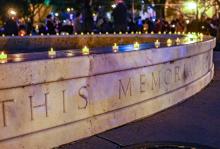
I WAS A COLLEGE student in a Southern town—newly out, wrestling with what this meant for my Christian faith, and dealing with daily homophobia on my campus—when I heard that a young man in Wyoming, close to my age, had been brutally murdered for being gay. His name was Matthew Shepard.
The details were horrific. He’d been fiercely beaten, tied to a fence, and left there in the cold for 18 hours. I pictured the scene over and over in my mind, unable to shake it. I couldn’t stop looking at the photos of him in happier times, wondering if we would have been friends—or if it could happen to me. His murder, though far away, made me feel lonelier and more afraid to be myself than I already was.
In October, 20 years after Matthew Shepard was murdered, his remains were laid to rest at the Washington National Cathedral. For many LGBTQ+ people, the interment brought some sense of closure.
Shepard’s death and the horrific murder of James Byrd Jr. are often linked because of Obama-era hate crime legislation named for both. Byrd was an African-American man killed for his race the same year Shepard was killed for his orientation. Byrd was beaten by white supremacists in Texas who urinated on him, tied his ankles to the back of a truck, and dragged him—still alive—for miles.

THE YEAR 2019 marks 400 years since a boat carrying “20 and odd” enslaved Africans landed at Point Comfort in colonial Virginia. To commemorate this and other historic 1619 events, Virginia will host “American Evolution,” a yearlong celebration in which these events have been transmuted into national values. The arrival of enslaved Africans on American shores has become “diversity.”
Yet, last summer a West African immigrant was deported back to Africa to face slavery, in a transatlantic reversal of journeys that underscores the persistence of immorality in this involuntary passage.
On Aug. 22, Seyni Diagne, a 64-year-old immigrant battling kidney cancer and hepatitis B, was deported from Dulles International Airport in Virginia to his home country of Mauritania after 17 years in the U.S. There he faces enslavement through forced labor. Mauritania has one of the highest rates of slavery in the world, impacting more than 40,000 black Mauritanians.
The day following Diagne’s deportation was the International Day for the Remembrance of the Slave Trade and its Abolition. The Commonwealth of Virginia chose to mark it by recognizing the first Africans in English North America.

INCIDENTS OF SEXUAL misconduct in faith communities shine a spotlight on issues of power in congregations.
As important as recognition, prevention, and intervention are for ending sexual violence, faith communities have significant work to do on routine, everyday abuses of power.
The way faith communities distribute labor and educational responsibilities, as well as committee assignments and financial obligations, often fall along stereotypical gender, class, and age lines. These mundane misuses of power in church settings desensitize us to recognizing serious boundary violations when they occur.
Faith communities assess power differentials and concurrent risks to determine policies that provide checks and balances on power imbalances. For example, individuals who are ordained have more power because of their level of education, professional status, and theological notions of representing God or a tradition. Adults have more power than youth because of social experience, economic means, or physical ability. In these dyads, power accrues to the individual with more resources. This is generally a solid starting point when assessing power differentials and then minimizing risk by creating practices of accountability. However, we rarely occupy one identity or one role when participating in congregations.
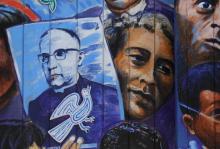
"THE CRY OF THE POOR rises to the heavens!” With one phrase, proclaimed at a conference of Catholic bishops in Medellín, Colombia, in 1968, history changed in Latin America.
Fifty years ago, the “princes of the church”—with the support of Pope Paul VI, who opened the gathering, and embodying the renewal of Vatican II—agreed to dethrone themselves. A “preferential option for the poor,” they said, would lead the renewed Catholic Church.
Bishops and priests, religious sisters and brothers, began working to change the historic structures of inequality and abuse that had existed in Latin America since the 15th-century invasion of the rapacious Spaniards. Faith was no longer held captive by the educated and powerful elites; now laypeople were empowered to make their faith their very own bread and Word. Christian base communities emerged. Theologians got busy listening “from below.”
A name was attached to the Medellín movement with the arrival of Father Gustavo Gutierrez’ groundbreaking book A Theology of Liberation. Liberation theology, rooted in the economically and politically oppressed, became the first modern theological movement to emerge in the Catholic Church outside of Europe.

The falsehoods are so thick, the hypocrisies so outrageous, the corruption so rife, the processes so broken that you don’t know if you trust anyone anymore. The vulnerable are mocked or torn from their parents’ arms. Men in expensive suits say “Lord, Lord,” like they own air and mineral rights to the Most High. But their God, the one you thought—if but reluctantly—that you shared, is no god you recognize.
How can the pieces ever be put back together, the damage undone? What is gospel truth now?
A knot of self-righteous rage, tangled inextricably with despair, owns your gut. The accusing thought comes that you’re complicit. You’ve not done enough; you’ve saved no one. Guilt is the final straw. A voice not quite your own yet completely your own snarls: “Burn. It. Down.”

EVERY POLITICAL LEADER on the planet should be stuck aboard a jet and taken north to see the Greenland ice sheet—it would be well worth the carbon emissions to show them just how fast climate change is now happening.
Case in point: I was aboard a boat en route to the Qaterlait glacier in August when I looked up at the GPS unit above the captain’s head. It showed an icon of the boat, steaming rapidly across ... solid land. That’s because when the chart was drawn a decade ago, the bay we were crossing didn’t exist: It was still solid ice.
I had the great fortune of journeying to the ice sheet with two young poets—a Greenlander named Aka Niviâna and a native of the Marshall Islands, Kathy Jetñil-Kijiner. These two remarkable women were at opposite ends of the same story—as the ice melted, the traditional life of Greenlanders was beginning to disappear. And the water that poured into the oceans is now drowning low-lying islands such as the Marshalls.

A NEW VISION for peace has broken out in the Horn of Africa. For nearly two decades, Ethiopia and Eritrea have been locked in one of the most intractable conflicts in Africa. From 1998 to 2000, nearly 75,000 people on both sides were killed in the war.
That changed in July when Ethiopian Prime Minister Abiy Ahmed and Eritrean President Isaias Afwerki signed a joint declaration of peace and friendship, which ended the war and promised cooperation. Abiy declared, “There is no border between Ethiopia and Eritrea. Instead, we have built a bridge of love.”
The stalled peace process rapidly progressed after Abiy was elected in April. Phone lines have reopened between Eritrea and Ethiopia, and flights between the two neighbors have resumed after 20 years. Families separated by the war are now able to communicate and reunite; many Ethiopians in the diaspora may now return home.
Abiy’s philosophy is that everyone should be included in the peace process. Speaking at a dinner with Eritrean President Afwerki, Abiy defined the idea of medemer (inclusion and multiplicity) in the peace process as “[t]ender love instead of abject cruelty, peace instead of conflict, love over hate, forgiveness over holding grudges, pulling instead of pushing ... Handled wisely, our differences are our assets.”
Abiy’s commitment to an inclusive process is rooted in his doctoral studies at the Institute for Peace and Security in Addis Ababa, where he focused on the role of religious communities in overcoming conflict. Abiy has highlighted the central role religion must play in reconciliation efforts between the two nations.
Ethiopian and Eritrean religious leaders have long worked for peace, even as political solutions lagged. Catholic bishops have asked every parish to offer special prayers and to organize events for peace. Cardinal Berhaneyesus Souraphiel, head of the Ethiopian Catholic Church, commented, “It is very pleasing to the Catholic Church that the prayers of the people of both countries have been answered ... steps taken so far by both governments prove that Africans have the wisdom to solve their problems themselves. The Catholic Church will continue to pray both for Ethiopia and Eritrea.”
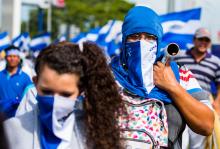
TENS OF THOUSANDS of Americans took the Pledge of Resistance in the 1980s to oppose funding for a U.S.-backed militia formed to overthrow the Sandinista government in Nicaragua. Now that government, led by Daniel Ortega, is accused of gross human rights violations against student protesters. What happened?
After nearly 12 years in office this time around, Ortega and what remains of the Sandinista movement now cling to power through repression, threats, and intimidation. Many of those who fought alongside the Ortega brothers to free their country from the Somoza dictatorship and joined arms to defend the revolution from Ronald Reagan’s contras have left the Sandinista party out of disgust or were purged by an increasingly autocratic Daniel Ortega.
Sandinismo has given way to Ortegismo. Ortega is determined to hold on to power through authoritarian rule rather than governing in the spirit of Ernesto Cardenal and Father Miguel d’Escoto.
Despite Ortega’s defeat at the polls in 1990, he never lost his thirst for power and ran for president in each successive election until he won in 2006. He was adept at exploiting the weaknesses, greed, and corruption of his old adversaries and creating new alliances with them. First, he struck a deal with former President Arnoldo Alemán, who was serving a 20-year sentence for corruption. In exchange for Ortega’s promise to overturn his sentence, Alemán supported a package of electoral and legal reforms that allowed Ortega to win in 2006 with just 38 percent of the vote and allowed Ortega to take control of the National Assembly and eventually the Supreme Court and Supreme Electoral Council.
Ortega also struck a deal with Nicaragua’s private sector council that had bitterly opposed him in the 1980s and helped finance his electoral defeat in 1990. Ortega and the council fashioned a pact in which Ortega agreed not to intervene in the dealings of the private sector and they, in turn, would refrain from getting involved in his political agenda.

A SMALL WHITE CHAPEL sits just a couple hundred yards north of the Rio Grande river in Mission, Texas. While the chapel no longer hosts an active parish, its interior shows signs of frequent use. Prayer candles and silk flowers line the altar and the base of a shrine to Our Lady of Guadalupe. An entryway table holds dozens of prayers, written on folded loose-leaf paper. Children’s composition notebooks, filled with more handwritten prayers, are stacked in piles.
“Please watch over our brothers, sisters, and all the children being held hostage at the border,” one prayer says. And another: “Please bless our health & the children being separated from their parents @ the border.”
La Lomita Chapel is now part of a municipal park and serves as a rest stop for passersby—while Border Patrol trucks sit just outside the park entrance and a helicopter circles overhead. The chapel land was originally granted to Missionary Oblates of Mary Immaculate priests in the mid-1800s. Given its location—midway between mission centers in Brownsville and Roma, Texas—La Lomita served as a meeting place and “housed transient visitors to the mission,” according to a historic marker on the site.
I visited the chapel, quite by accident, during a reporting trip at the border at the height of the family separation crisis. The separation of parents and children moved the hearts—and wallets—of people across the nation. But that fervor waned after a U.S. District Court judge gave a July deadline for reunification and more than 1,500 children were reunited with their parents, largely thanks to the efforts of faith groups and advocates. For many, it seemed, the story was over. The reality is that the crisis continues.
As of this writing, 497 children remain separated from their parents, 22 of whom are under the age of 5. More than 300 parents have been deported, and many who signed a waiver to be reunited say they were coerced. Children, including some babies and toddlers, haven’t seen their parents in months. It’s likely that some of those children will never see their parents again.

THE #METOO movement against sexual assault and harassment has empowered many people in the workplace to speak out. But there’s one group still fighting to be heard: interns—the semi-skilled students and recent graduates seeking supervised practical experience in a profession and who form the backbone of many government, nonprofit, and religious organizations.
In March, Vox caused an uproar when it released copies of a nondisclosure agreement required of all congressional interns. Notably missing was an “exception for incidents of harassment, discrimination, or abuse.” The Washington Post reported that interns who came forward about sexual harassment in California, Oregon, Nebraska, and Massachusetts all had their cases dismissed, “leaving them in legal limbo.”
The absence of legal workplace protection is only one reason interns are dissuaded from reporting harassment. A second is lack of power. Internships are generally temporary and unpaid. Interns fall in a hierarchical gray area that leaves them particularly susceptible to exploitation and harassment.
In a USA Today commentary headlined “Dear interns, we’re sorry. We should have warned you about sexual harassment,” Jill Geisler of Loyola University Chicago wrote: “We’ve learned that workplace sexual misconduct is about abuse of power. And those with the least power are the most vulnerable.”
The Bible is full of cries to protect the vulnerable. It warns against seeking power over others. Yet Anglican Bishop Peter B. Price notes that “abuse of power is one of the greatest temptations for Christian leaders”—the consequence of which is not just scandal, “but the loss of a unique corporate authority, achieved by mutual self-giving.”

WITH LABOR DAY approaching and November elections weighing down on us, it is a good time to reflect on the economic predicament of the working majority—those of us who work for a living to support our families. But if both voters and candidates do not clearly understand how the current economic situation impacts them, who benefits, and what alternatives are possible, then voting will not create much change.
Every day it becomes clearer that our current political-economic system, called neoliberal capitalism, enriches the wealthiest few while the proverbial “99 percent” struggles with four decades of stagnant wages, never-shrinking college and credit card debt, a scarcity of affordable housing and accessible public transportation, a lack of comprehensive health care, unpredictable, on-demand work schedules, failing and systematically defunded public education and infrastructure systems, and the exclusion of large sections of the population through incarceration, racism, impoverishment, illness, disability, and inadequate education.
We need serious discussions in our churches, communities, workplaces, and union halls about the U.S. economy. Is the system working for us? Does it have to be this way?

WHEN DID YOU realize your textbooks lied to you?
I grew up in the Pacific Northwest and was homeschooled by my mother, the wife of a conservative Christian pastor. I didn’t think too much about my education until the 2016 election when I became increasingly alarmed by the enthusiastic support white evangelicals gave to Donald Trump. When Trump ascended into office, riding in on the phrase “Make America Great Again,” my memory was pricked. I had heard all this before.
To check it out, I obtained two history textbooks that I had used growing up. In 1999, when I was a sophomore in high school, 1.7 percent of the U.S. population was homeschooled. By 2012, the percentage had doubled. When I was homeschooled, there were three prominent curriculum producers for Christian homeschooling: Abeka Press, Bob Jones University Press, and Accelerated Christian Education. Abeka remains the most popular. Officials at Abeka, according to the Orlando Sentinel, would not say how many textbooks the company sells or release the number of schools that use their curriculum, but said that “it is safe to say that millions of students” have used the materials.
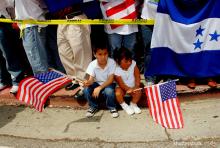
IN MAY, the Trump administration ended Temporary Protected Status for Hondurans, opening the door for the deportation of nearly 60,000 legal immigrants to the U.S. and threatening the security of their American-born children. The Department of Homeland Security is systematically stripping TPS status from more than 300,000 people, including immigrants from El Salvador (195,000), Haiti (50,000), Nepal, Nicaragua, and Sudan. Decisions on Yemen and Somalia are expected in July.
Temporary Protected Status enables foreign nationals to live and work in the United States while conditions exist in their home countries that prevent safe return, such as armed conflict, natural disaster, or other extreme circumstances. Hondurans were granted TPS following Hurricane Mitch in 1998. Honduras holds the second-highest rate of nationals murdered after their deportation, according to the Immigrant Legal Resource Center.
The “crucified people” from Central America are “not so much pursuing the American dream as they are fleeing the Central American nightmare,” said Jesuit priest Dean Brackley, who spent more than 20 years teaching in San Salvador, in 2011.
